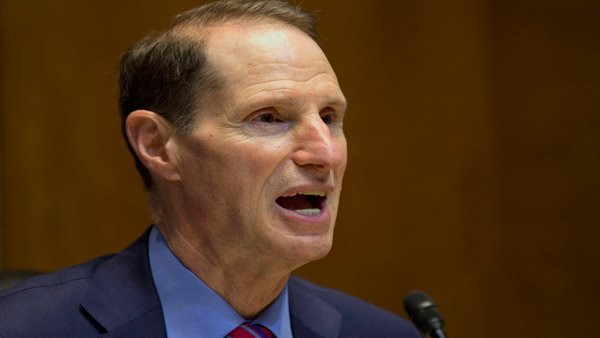 Sen. Ron Wyden, D-Ore. (Photo: AP)
Sen. Ron Wyden, D-Ore. (Photo: AP)
Sen. Ron Wyden, D-Oregon, the ranking member on the Senate Finance Committee, has introduced legislation to limit tax breaks for donations to colleges that are made to influence admission decisions.
The College Admissions Fairness Act would require colleges and universities to establish a policy that bars consideration of a family's donation or its ability to donate as a factor in the admissions process in order for those donations to be fully tax-deductible.
If the university failed to implement such a policy, deductions would be limited to $100,000 of donations over a six-year period prior to or during the child's university attendance.
The bill would also amend the Higher Education Act to require that any institution receiving federal financial aid implement the required policy and report the number of applicants, admitted students and enrolled students who are the children of donors. The Department of Education would make that data publicly available, and institutions would include the information on their annual IRS filings.
“It's absurd that the tax code subsidizes the top 1% buying their way into school,” Wyden said in a statement. “Colleges and universities would be able to preserve the tax deductibility of all donations if they simply bar their consideration in admissions decisions. It's 'one and done'—implement a policy and you're in compliance.”
Wealthy families have historically had an advantage in the college admissions process, especially for nonprofit private institutions due to family donations, legacy applications and other factors, but the subject didn't attract broad attention until the recent college admissions scandal in the U.S.
More than 30 parents were charged with paying a consultant to bribe coaches or other college officials or to facilitate cheating on admissions tests in order to get their children admitted to a number of prestigious universities including Stanford, Georgetown, UCLA and USC. Those payments were illegal, unlike family donations to colleges.
Mark Kantrowitz, publisher and vice president of research at Savingforcollege.com, says Wyden's bill “makes sense” because “if a donor receives a benefit from making a donation, the donation should not be tax deductible,” but he didn't think the legislation would eliminate the advantages that many wealthy families have.
Parents could still make donations to a school even though they would lose some or most of the tax deduction, and colleges could still solicit their donations and admit the students, noting that the donors have the responsibility to properly claim income tax benefits, says Kantrowitz.
Also, so-called “developmental admits” — students who are admitted because of the ability of the student's parents to donate a building or endow a faculty chair — would not be eliminated because colleges could still expect that a student's family will eventually make a donation, says Kantrowitz.
Bob Shireman, director of higher education excellence and senior fellow at The Century Foundation, said colleges will argue that “a large donation can finance several low-income students' tuition, so selling a seat to a rich person can have an upside. In that case, there should be some minimum expectation for the socioeconomic diversity of the college.”
But even that argument “prompts the right discussion,” Shireman says.
© 2025 ALM Global, LLC, All Rights Reserved. Request academic re-use from www.copyright.com. All other uses, submit a request to [email protected]. For more information visit Asset & Logo Licensing.







